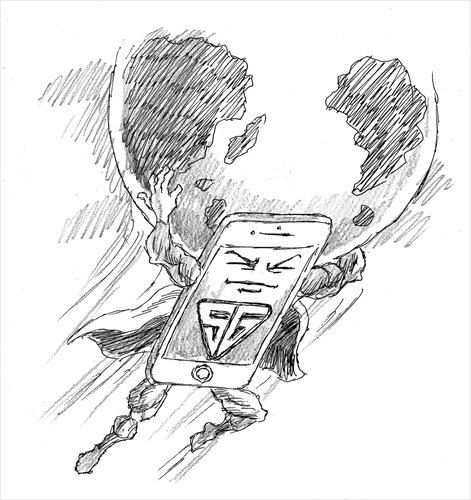HOME >> BUSINESS
5G telecom services set to span, transform world
Source:Global Times Published: 2015-10-21 23:38:01
UK, China cooperation can speed up adoption of new tech

Illustration: Peter C. Espina/GT
The recently announced 5G Innovation Centre (5GIC) at the University of Surrey, in which Chinese telecommunications giant Huawei is a major partner, hopes that fifth-generation (5G) global telecoms standards will be achieved through global collaboration so that people across the world can benefit from a single standard, which will be commercialized from 2020.
Closer ties being fostered between China and the UK in pushing for the adoption of the standard could be of key importance for the vision to be realized.
Chinese President Xi Jinping's state visit to the UK shines a light on the existing partnerships the countries have developed, and will hopefully lead to further cooperation between the two countries, from fundamental research to innovation.
Both countries share a vision of a true digital economy and safer Internet. These were priorities echoed in a visit to 5GIC on Tuesday by a 40-strong delegation led by the Cyberspace Administration of China.
The delegation also included representatives from Chinese companies such as Baidu and Tencent. Strengthening ties with China is a priority for 5GIC, and the UK in general and this cooperation is vital for ensuring that a global standard is reached by 2020.
These shared areas of innovation, especially in the Internet-of-things (IoT) have already led to 5GIC and Huawei developing next-generation technologies in close collaboration.
Both countries are paying particular attention to technologies that will enable smart homes, smart cities, smart countries and eventually a smart planet.
It is envisioned that 5G standards that will underpin networks will be finalized by 2017, and the first phase of 5G services will be available in the market by 2020. These services will evolve over time, and a full 5G network will serve the market globally by 2040.
5G services will be highly reliable with very fast response times. The technology will provide much more thorough convergence among fixed broadband, mobile and broadcasting services, as well as providing a much better user experience.
Also, 5G is not only about super-fast networking. It will be a transformative technology, and part of this transformation will be the new ecosystem of applications it enables, especially those related to the IoT.
The IoT is an important component of 5G technology and is expected to modernize and transform other industries such as healthcare, connected cars and homes. How it is used will depend on the applications developed by businesses, in collaboration with governments. If countries wish to move toward a digital future, they must embrace 5G technology, which will be the most cost-effective and environmentally friendly way of realizing global connectivity.
Some regions already have advanced infrastructure in place to deliver 5G services, not least our own region of Guildford in the UK, which is home to 5GIC's 5G test bed. On a global scale, the leaders in this area, such as the UK, Europe and Far East (in particular China, Japan and South Korea), will be the first adopters of 5G networks.
The rise of Machine to Machine (M2M) applications has also been seen across the world, particularly in China, in which remote sensors and a wide range of devices will connect themselves directly to the IoT network.
Therefore, there is immense potential for British companies and universities to collaborate with their counterparts in China to take advantage of this rapidly rising global market for M2M applications.
The benefits of cooperation between the two countries include the opportunity to "spark" creatively off the different innovation cultures that exist and to ensure that new applications are developed starting with a truly global view.
And it's not just about technology; it's also about incubating new start-up companies in the UK and China. For example, early in 2014, Spanish telecommunications company Telefónica announced it was expanding its Wayra Accelerator Network to Asia via a collaboration with China's Virtue Inno Valley (VIV), an incubator backed by Tsinghua University.
This will be the 14th Wayra Academy globally, the others being in Western Europe (including London) and Latin America, each of which incubate a yearly crop of tech companies. These incubation centers will provide hot spots of hi-tech innovation and also foster a growing band of globally networked entrepreneurs working in the digital economy.
This article was compiled by Global Times reporter Li Qiaoyi based on an e-mail interview with Rahim Tafazolli, director of the 5G Innovation Centre at the University of Surrey. bizopinion@globaltimes.com.cn
Read more in Special Coverage:

Posted in: Expert assessment